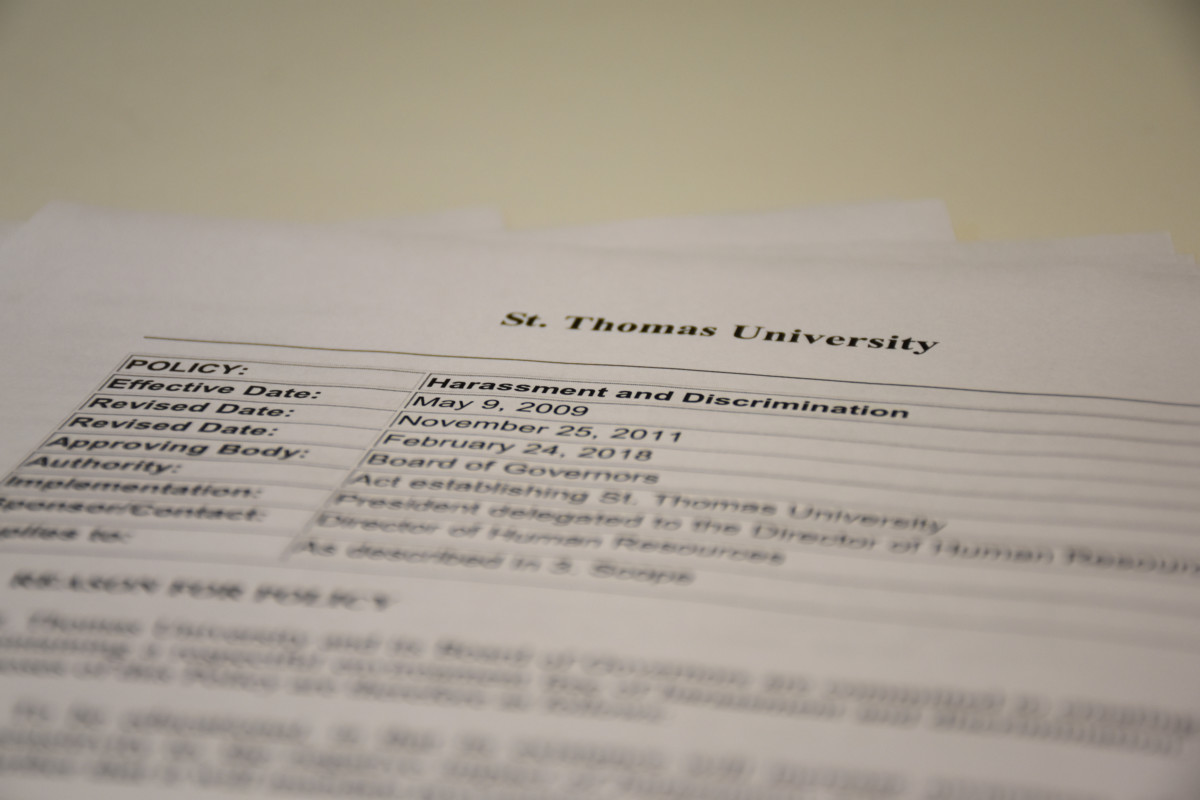
St. Thomas University has started a consultation phase on the newly revised draft harassment and discrimination policy, according to Robin Vose, the president of the Faculty Association of the University of St. Thomas (FAUST).
Vose was a member of the committee that revised the policy in recent months of 2019.
“I think we did improve it as much as we could while maintaining the format of the policy,” he said.
The harassment and discrimination policy was last revised in November 2018. It covers discrimination, harassment, discriminatory harassment, personal or psychological harassment and sexual harassment between students and faculty and/or staff that occur on campus, off-campus or at university-related events or meetings. It does not cover matters exclusively between students.
At a FAUST-hosted panel on sexual harassment on campus and in the workplace last September, multiple students expressed concerns about the policy’s position on confidentiality.
Under the 2018 version of the policy, the alleged respondant would learn the identity of the complainant if the complaint went to a formal investigation. Vose said, in the revised draft, this is still the case.
STU’s harassment policy under fire at professor union panel
Vose, also a history professor at STU, said not being able to know the nature of your allegations can be a form of psychological torture. It’s what they did in the Spanish Inquisition, said Vose. Still, he’s conflicted.
“How do you achieve that balance to protect vulnerable people?”
Vose said the biggest change to the not-yet-approved policy was the addition of an external person that would oversee the policy’s execution, called the Harassment and Discrimination Policy Administrator.
Vose said it’s important to have additional oversight.
“The idea is that we also need a dedicated professional, someone who is actually trained, not just [for example] a philosopher or psychologist who do this in their spare time.”
In the 2018 revised policy, there were complaint officers who dealt with complaints between STU employees and students or between employees. In the new draft of the policy, the administrator will oversee the officers.
Vose said originally the “administrator” was going to be a newly hired staff member at St. Thomas University however, when budget and other factors were considered, the committee decided to hire an administrator that would operate externally and come to campus when needed.
Vose said he initially spoke against this (in addition to labelling the position “administrator”). He said he would rather see a new hire on campus who would be the policy’s administrator and dedicate time to educate, train and raise awareness on campus.
Still, Vose said this external oversight has worked well for the University of Prince Edward Island, but it might not be enough for STU to have an administrator.
“Again, having a good policy is one thing, but caring for people, when they come forward is another layer of this. We still need to talk more about it. That’s where I think it’s not enough maybe just to have a policy administrator, we need to have resources that help support them.”
He said the committee also tried to make the document simpler and make more sense.
“It was a really hard document to read, I think. And of course, people who have just been traumatized are probably not in a great place to start reading a 17 or 20-page policy document to figure out ‘what do I do.’”
Vose said the newly revised policy still has to go to STU’s Board of Governors for approval. The committee who helped revise the policy, made up of one representative from the student body, two representatives from faculty, three representatives from administration and one representative from staff, approved the most recent draft in October 2019. Until then, it’s been sent to FAUST, among potentially other unknown bodies, for “consultation.”
Despite the changes to the policy, Vose said the culture is the bigger issue that needs to change.
“If we don’t have a campus full of abusive, harassing, discriminating people, or if we have a campus culture that comes to a consensus that ‘This is wrong, we’re all going to stand up against it, we’re all going to inform each other about it, we’re all going to support victims,’ then the policy is almost unnecessary.”
